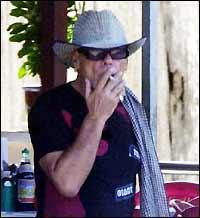Dems pledge to sever ties to lobbyists

Be still my heart.
On Day 1 of the next session of Congress, newly empowered Democrats are promising restrictive rules to "break the link between lobbyists and legislation." The city's veteran lobbyists know what to expect on Day 2: requests for political donations from the Capitol's new stewards.
Ethics watchdog groups are hopeful as incoming House Speaker Nancy Pelosi, D-Calif., readies the Democrats' "Honest Leadership and Open Government" initiative for opening day in January. The plan includes a list of changes designed to clean up what the party calls "a culture of corruption" in Washington.
Exit polls from Tuesday's election compel Democrats to act. Three-fourths of voters said corruption and scandals were very or extremely important to them. That group tended to vote for Democratic House candidates, according to voter surveys conducted for The Associated Press and the television networks.
But some lobbyists, tired of being condemned for Washington's influence culture, remain skeptical.
"Let's not place the entire blame on lobbyists, so you can have a press conference, and then call us the next day and ask for campaign contributions," said Paul Miller, president of the American League of Lobbyists. "There are just as many Democratic lobbyists as Republican lobbyists."
And that bullshit is exactly why K Street needs to be cleaned. Take a look at this:
When presidents pick someone to fill a job in the government, it's typically a very public affair. The White House circulates press releases and background materials. Congress holds a hearing, where some members will pepper the nominee with questions and others will shower him or her with praise. If the person in question is controversial or up for an important position, they'll rate a profile or two in the papers. But there's one confirmation hearing you won't hear much about. It's convened every Tuesday morning by Rick Santorum, the junior senator from Pennsylvania, in the privacy of a Capitol Hill conference room, for a handpicked group of two dozen or so Republican lobbyists. Occasionally, one or two other senators or a representative from the White House will attend. Democrats are not invited, and neither is the press.
The chief purpose of these gatherings is to discuss jobs--specifically, the top one or two positions at the biggest and most important industry trade associations and corporate offices centered around Washington's K Street, a canyon of nondescript office buildings a few blocks north of the White House that is to influence-peddling what Wall Street is to finance. In the past, those people were about as likely to be Democrats as Republicans, a practice that ensured K Street firms would have clout no matter which party was in power. But beginning with the Republican takeover of Congress in 1994, and accelerating in 2001, when George W. Bush became president, the GOP has made a determined effort to undermine the bipartisan complexion of K Street. And Santorum's Tuesday meetings are a crucial part of that effort. Every week, the lobbyists present pass around a list of the jobs available and discuss whom to support. Santorum's responsibility is to make sure each one is filled by a loyal Republican--a senator's chief of staff, for instance, or a top White House aide, or another lobbyist whose reliability has been demonstrated. After Santorum settles on a candidate, the lobbyists present make sure it is known whom the Republican leadership favors. "The underlying theme was [to] place Republicans in key positions on K Street. Everybody taking part was a Republican and understood that that was the purpose of what we were doing," says Rod Chandler, a retired congressman and lobbyist who has participated in the Santorum meetings. "It's been a very successful effort."
If today's GOP leaders put as much energy into shaping K Street as their predecessors did into selecting judges and executive-branch nominees, it's because lobbying jobs have become the foundation of a powerful new force in Washington politics: a Republican political machine. Like the urban Democratic machines of yore, this one is built upon patronage, contracts, and one-party rule. But unlike legendary Chicago mayor Richard J. Daley, who rewarded party functionaries with jobs in the municipal bureaucracy, the GOP is building its machine outside government, among Washington's thousands of trade associations and corporate offices, their tens of thousands of employees, and the hundreds of millions of dollars in political money at their disposal. [emphasis mine]
Its part of the culture. These assholes lie. They can't help themselves. Its what they do. And its exactly why we have to muzzle them.














0 Comments:
Post a Comment
<< Home